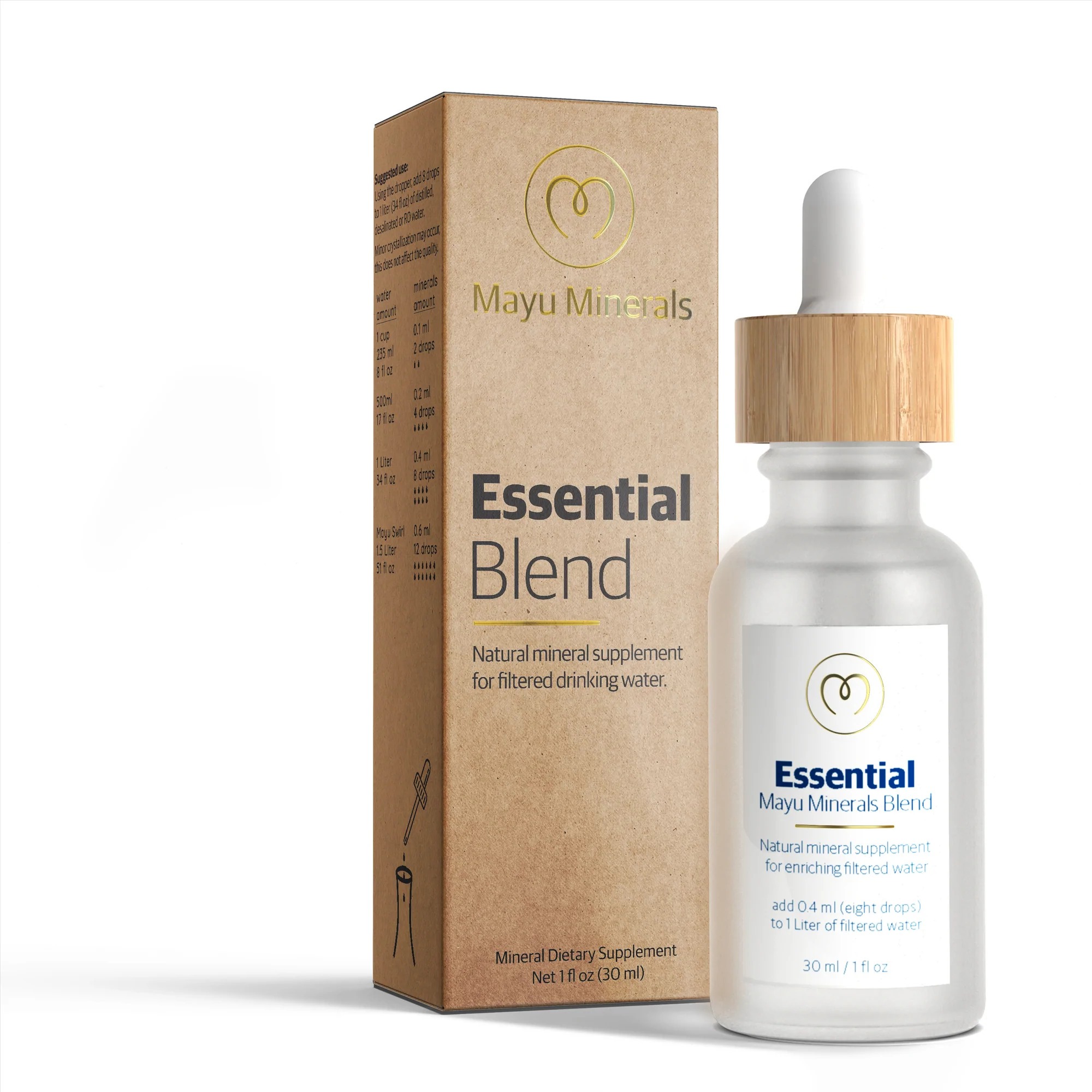Why You Should Drink More Water During Your Period
Explore why increasing your water intake during your period is essential. From reducing bloating to improving mood, hydration plays a key role in your comfort.
Updated December 12, 2024

Every month, millions of women endure the familiar discomfort of menstruation: cramps, bloating, mood swings, and fatigue. While these symptoms are common, they don't have to be debilitating. A simple yet often overlooked solution could be as close as your kitchen faucet.
Proper hydration can significantly alleviate these menstrual woes and improve overall well-being. By understanding the science behind hydration and its impact on the female body, you can control your menstrual health and experience a more comfortable cycle.
» Hydrate yourself during period using a blend of essential minerals
The Hydration-Menstruation Connection
During menstruation, the body undergoes several changes. The brain signals the pituitary gland and hypothalamus to release hormones that help eggs mature and prepare for release (ovulation) [1].
If an egg isn't fertilized, the body resets for a new cycle. This reset involves shedding the uterine lining, which causes bleeding. Hormonal shifts during this time can lead to water retention [2].
While more research is needed, some early studies suggest that dehydration may worsen menstrual pain [3]. Women seem to be more prone to dehydration during their period, which can lead to symptoms like fatigue, headaches, and dry skin. These symptoms, combined with menstrual discomfort, can negatively impact overall health and quality of life.
» Learn about the best types of water for rehydration
6 Benefits of Drinking More Water During Your Period
1. Cramp Relief
Staying hydrated can help alleviate common menstrual symptoms. During your period, hydration can specifically help ease cramps and bloating [4]. Additionally, drinking plenty of water can help flush out your urinary tract, reducing the risk of yeast infections.
2. Increased Blood Thickness
During menstruation, blood becomes thinner, potentially reducing the risk of heart disease in premenopausal women. But, dehydration can thicken the blood, which may worsen circulation and increase heart disease risk. To maintain heart health, it's essential to stay well-hydrated during your period.
3. Regulated Hormones
Drinking more water during menstruation can affect hormone levels, which may influence the severity of menstrual symptoms like pain [5]. Hormones like antidiuretic hormone, aldosterone, and atrial natriuretic peptide primarily regulate the body's fluid balance.
Blood loss during menstruation, combined with increased dehydration risk, can further disrupt hormone balance. Certain types of water, like alkaline and mineral water, can enhance hydration benefits. Alkaline water, especially, is beneficial during exercise. Demineralized water, on the other hand, may negatively impact long-term nutrient intake. That's why mineral-infused water can support overall health [6].
4. Boosted Energy
In addition to the benefits already mentioned, staying hydrated during menstruation can boost energy levels, regulate body temperature, and improve skin hydration. Increased energy and better temperature regulation can support regular exercise and help you tolerate heat better. Exercise, in turn, can reduce bloating and improve sleep.
5. Improved Skin Health
Proper hydration can support healthy skin, which can help combat the dryness often experienced during menstruation [7]. This can reduce discomfort and boost self-confidence. These benefits can contribute to an improved quality of life.
6. Heightened Focus
Proper hydration also supports cognitive function, including memory, focus, and mood [8]. Even a small amount of dehydration can negatively impact cognitive performance. Preventing dehydration can help improve sleep and mood, both of which contribute to overall well-being [9].
» Discover easy ways to add electrolytes to your water for rehydration
Additional Hydration Methods for Menstruation
In addition to water, you can stay hydrated during your period by consuming hydrating foods and electrolyte-infused beverages.
- Hydrating Foods: Fruits, vegetables, soups, and teas are excellent sources of fluids. These can be especially helpful if bloating makes it difficult to drink large amounts of water.
- Electrolytes: Adding electrolytes to your water can enhance hydration, particularly if you're not a big water drinker. The MAYU Electrolyte Drops can help your body absorb water more efficiently.
» Learn how to choose the best water to optimize your health
Hydrate Your Way to Period Relief
As we've explored, the simple act of drinking more water can profoundly impact a woman's menstrual experience. By staying hydrated, we can mitigate a range of common symptoms, from painful cramps to mood swings. The science is clear: hydration plays a vital role in regulating hormones, reducing inflammation, and optimizing bodily functions.
So, the next time you're feeling under the weather during your period, don't underestimate the power of water. By making a conscious effort to drink more, you can alleviate discomfort, boost your mood, and improve your overall quality of life.
MAYU Essential Minerals can be a beneficial addition to your hydration routine, especially during menstruation. Staying hydrated is crucial for alleviating common menstrual symptoms, and these mineral blends can enhance the quality of your water, potentially improving your overall health during this time.
References:
- D. K. Thiyagarajan, H. Basit, and R. Jeanmonod, “Physiology, menstrual cycle,” StatPearls - NCBI Bookshelf, Sep. 27, 2024. Available: https://www.ncbi.nlm.nih.gov/books/NBK500020/
- Y. Nose, K. Fujita, T. Wada, K. Nishimura, and M. Hakoda, “Effects of Menstrual Cycle Phase on Fluid Regulation during Walking Exercise,” Aug. 13, 2020. Available: https://pmc.ncbi.nlm.nih.gov/articles/PMC7429427/
- B. Tan, M. Philipp, S. Hill, A. M. C. Muhamed, and T. Mündel, “Pain across the menstrual cycle: Considerations of hydration,” Frontiers in Physiology, vol. 11, Oct. 2020, doi: 10.3389/fphys.2020.585667. Available: https://pmc.ncbi.nlm.nih.gov/articles/PMC7578918/
- B. Torkan et al., “The role of water intake in the severity of pain and menstrual distress among females suffering from primary dysmenorrhea: a semi-experimental study,” BMC Women S Health, vol. 21, no. 1, Jan. 2021, doi: 10.1186/s12905-021-01184-w. Available: https://pubmed.ncbi.nlm.nih.gov/33509179/
- E. Johnson et al., “Hormonal and Thirst Modulated Maintenance of Fluid Balance in Young Women with Different Levels of Habitual Fluid Consumption,” Nutrients, vol. 8, no. 5, p. 302, May 2016, doi: 10.3390/nu8050302. Available: https://pmc.ncbi.nlm.nih.gov/articles/PMC4882714/
- J. Chycki, T. Zając, A. Maszczyk, and A. Kurylas, “The effect of mineral-based alkaline water on hydration status and the metabolic response to short-term anaerobic exercise,” Biology of Sport, vol. 3, pp. 255–261, Jan. 2017, doi: 10.5114/biolsport.2017.66003. Available: https://pubmed.ncbi.nlm.nih.gov/29158619/
- L. Rodrigues, L. Palma, L. T. Marques, and J. B. Varela, “Dietary water affects human skin hydration and biomechanics,” Clinical Cosmetic and Investigational Dermatology, p. 413, Aug. 2015, doi: 10.2147/ccid.s86822. Available: https://pmc.ncbi.nlm.nih.gov/articles/PMC4529263/
- S. K. Riebl and B. M. Davy, “The hydration equation,” ACSMʼs Health & Fitness Journal, vol. 17, no. 6, pp. 21–28, Nov. 2013, doi: 10.1249/fit.0b013e3182a9570f. Available: https://pmc.ncbi.nlm.nih.gov/articles/PMC4207053/
- S. Qayyum, S. Iltaf, M. Sajjad, and M. Azam, “Association of sleep patterns and water intake with cognitive functions in adults in an urban environment,” Pakistan Journal of Medical Sciences, vol. 40, no. 4, Feb. 2024, doi: 10.12669/pjms.40.4.8268. Available: https://pubmed.ncbi.nlm.nih.gov/38544990/
Disclaimer: The information published by MAYU Water is not a substitute for the expert knowledge, advice, and recommendations of trained professionals. We strongly recommend consulting with industry experts and primary or scientific sources before making any health, research-related, or other important decisions.
















































